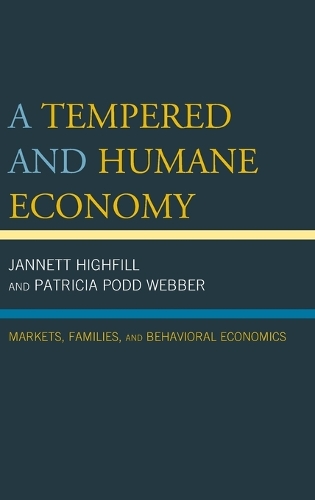
A Tempered and Humane Economy: Markets, Families, and Behavioral Economics
(Hardback)
Available Formats
Publishing Details
A Tempered and Humane Economy: Markets, Families, and Behavioral Economics
By (Author) Jannett Highfill
By (author) Patricia Podd Webber
Bloomsbury Publishing PLC
Lexington Books
23rd December 2014
United States
Classifications
Professional and Scholarly
Non Fiction
330.01
Physical Properties
Hardback
192
Width 159mm, Height 234mm, Spine 20mm
422g
Description
A tempered and humane economy finds a balance between the market principle, economic reward follows economic contribution, andthe family economic principle, respect abilities, respect needs. Markets are tempered by the wisdom gained from familyexperiences in the way that steel is iron tempered by fire. A humane economy meets the needs and aspirations of all persons in the way that a well-tempered musical instrument allows for the playing of music in every key without discord. A Tempered and Humane Economy:Markets, Families, and Behavioral Economicsargues that economists must incorporate the insights of behavioral economics into their reflections on micro- and macro-economic policy. The elephant in the room is how Americans are increasingly raising their children with an appropriate sense of entitlement and empowerment by involving them in decision making at home. We raise our children to find or create a job they will love, expecting that will make them highly productive. Not all children have these advantages, a problem we tackle head on, but enough of them do to create acritical mass of young adults whowill transform our economy in a positive way forpersons everywhere along the income distribution. Our vision for the U.S. Economy is one of tempered optimism and humane prosperity.
Reviews
The authors nicely explain and analyze the wisdom and discipline that emerge from families and from markets. The book provides a very readable account of many issues pertaining to poverty and wealth. Replete with examples from everyday life, the book should be of interest to economists and non-economists alike. -- Daniel K. Biederman, University of North Dakota
In this present age in which market economies are often perceived as amoral, or even immoral, the questions addressed by Highfill and Webber are more relevant than ever before. This book makes an important contribution to the conversation about the role of interpersonal relationships in a largely impersonal market system. Highfill and Webber combine their personal experiences and observations with an economic way of thinking that results in a thoughtful statement about what a humane economy can be and how we might move in that direction. -- William J. Polley, Western Illinois University
Author Bio
Jannett Highfill is a professor of economics at Bradley University. Pat Webber is retired from many years of teaching economic principles, most recently twenty-five years at Bradley University.
